COVID-19, or the novel coronavirus, is changing the landscape of the world as we know it. The introduction of lock downs, stay-at-home orders, social distancing and work from home, has provided us with a new normal. How do you handle this new normal if you’re a nurse working with patients with COVID-19? We talked to Trinity nursing alumnae who have graduated within the last two years to see their perspective of being on the front lines of the pandemic.
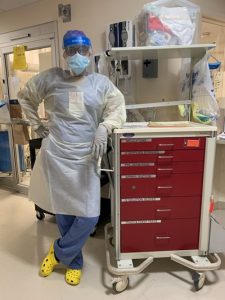 British Abrams ’19 has always known she wanted to be a nurse since the age of four. She is an RN working in the cardiovascular intensive care unit at Medstar Washington Hospital Center. She likes working with the heart system as the heart is a complex organ and it affects the rest of the body. “If something goes wrong with the heart, it will have an impact on your body,” says Abrams.
British Abrams ’19 has always known she wanted to be a nurse since the age of four. She is an RN working in the cardiovascular intensive care unit at Medstar Washington Hospital Center. She likes working with the heart system as the heart is a complex organ and it affects the rest of the body. “If something goes wrong with the heart, it will have an impact on your body,” says Abrams.
Right now, the department where she works has some COVID-19 patients-especially the sickest. The role of nurses and doctors in the medical ICU is to stabilize the patients but the various treatment options are trial and error. In order to help the patients in need, Abrams must gown up in protective gear and is careful to limit interaction with the patients so there won’t be a chance of infection or making the patient worse.
She believes the pandemic will “change nursing policies in the future because as a nurse you will always have the concern whether you will catch it yourself or if you will make a patient sicker.” She wants people to take this seriously because there is still much unknown about this virus.
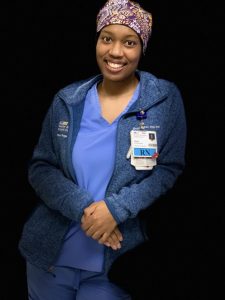 Elexis Brown ’19 is currently working as an RN in the surgical and medical ICU at Medstar Washington Hospital Center. As a child, Brown looked up to her older cousin who wanted to be a doctor and wanted to follow in her footsteps. As she got older, she saw it was the nurses that take care of the patients and it steered her more toward that profession. The bedside manners, hands-on care with patients, and comforting family members is what Brown wanted to do.
Elexis Brown ’19 is currently working as an RN in the surgical and medical ICU at Medstar Washington Hospital Center. As a child, Brown looked up to her older cousin who wanted to be a doctor and wanted to follow in her footsteps. As she got older, she saw it was the nurses that take care of the patients and it steered her more toward that profession. The bedside manners, hands-on care with patients, and comforting family members is what Brown wanted to do.
“I think the pandemic has made things a little scary and stressful”, says Brown. She has had to adapt to a new norm by dressing in protective gear, disinfecting the nursing station, and changing her clothes before going home because you do not want to bring in anything in your house. “You have to be more cautious in checking on patients, try not to go in and out of their room as often.”
Elexis says, “People need to take this more seriously because this is serious.” She has seen more deaths in her almost one year at the hospital because of this virus. “You need to wash your hands, practice social distancing and stay at home,” she says. This virus affects everyone. “I have friends who are young and they think this won’t affect them-but it can because you don’t know who has it.”
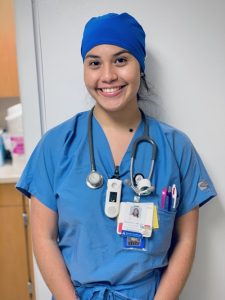 Stephanie Flores ’19 is currently working as a step-down ICU nurse at Shady Grove Hospital. Her unit has had to change some areas to accept COVID-19 patients, especially ones with heart issues. She is the first in her family to graduate from high school and go to college. As a child, she remembers seeing a man in blue scrubs and surgical cap and she needed to meet him. She wanted to go beyond the call of duty and make sure that each patient receives the best care with the utmost kindness and compassion.
Stephanie Flores ’19 is currently working as a step-down ICU nurse at Shady Grove Hospital. Her unit has had to change some areas to accept COVID-19 patients, especially ones with heart issues. She is the first in her family to graduate from high school and go to college. As a child, she remembers seeing a man in blue scrubs and surgical cap and she needed to meet him. She wanted to go beyond the call of duty and make sure that each patient receives the best care with the utmost kindness and compassion.
As a healthcare professional, she never thought she would have to deal with anything like this pandemic. “I didn’t realize how emotionally draining it would be for me as I have only been a nurse for eight months,” she says. “I have to make sure that I am gowned up and wearing protective gear. It is not easy to bundle our care and limit ourselves from going in and out of the patient’s rooms.” She is usually the one with patients before they die as family members cannot visit with them during this pandemic. Her motto is, “Treat patients like they are my family.”
Stephanie says, “I don’t feel like I am a hero. I’m doing what I love, what I need to do. We are learning as we’re working on patients with COVID-19. Each week we learn something new. We’re the hero for the patients and their family. Families won’t remember all that went into keeping the patient alive but what happened in their last moments.”
She also wants people to take this pandemic very seriously and gets upset when she sees protesters. “People don’t see what we see in the hospital, so please do your best to protect yourselves.”
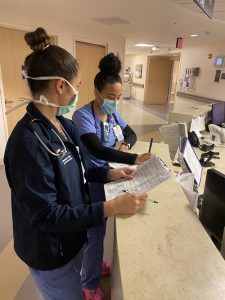 Samantha Jackson ’18 (on the right in light blue scrubs) is a nurse in the cardiac step-down unit at Medstar Washington Hospital Center. Patients go to her unit when they have had open heart surgery and they stay in that unit until they are ready to be discharged. She has always wanted to be a cardiac nurse and sees herself one day becoming an ICU nurse. She says when her grandmother and dad were very sick she saw all the nurses and the work they did to help them. Jackson saw the care, compassion and professionalism they provided and wanted to be able to do the same for other families going through a hard time.
Samantha Jackson ’18 (on the right in light blue scrubs) is a nurse in the cardiac step-down unit at Medstar Washington Hospital Center. Patients go to her unit when they have had open heart surgery and they stay in that unit until they are ready to be discharged. She has always wanted to be a cardiac nurse and sees herself one day becoming an ICU nurse. She says when her grandmother and dad were very sick she saw all the nurses and the work they did to help them. Jackson saw the care, compassion and professionalism they provided and wanted to be able to do the same for other families going through a hard time.
“Right now, we do work with some COVID-19 patients. We are limiting the amount of time going into their rooms. You are gowned up from head to toe in gloves, N95 masks, and face shields so you are not bringing anything into their room or bringing anything outside of the room.”
She says it’s a stressful time right now because of the fear of the unknown. “You don’t know how people are contracting this virus. We are constantly learning how to take care of patients. People are getting sick, workers are getting sick and some people have passed away from this virus.”
People need to understand that it is very important to stay at home, practice social distancing, wash your hands and cover your face. She knows it is hard to remain under the restrictions and to stay at home, but this virus is serious. “Some people have gotten sick with it and some of them have gotten sick again. Please be cautious and wash your hands and try not to touch your face.”
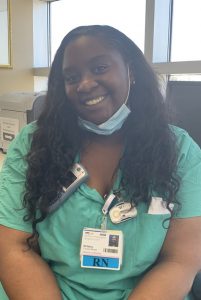 Brittany Walker ’19 is a nurse in the Labor & Delivery unit at Medstar Washington Hospital Center. They have regular patients as well as some COVID-19 patients in the unit.
Brittany Walker ’19 is a nurse in the Labor & Delivery unit at Medstar Washington Hospital Center. They have regular patients as well as some COVID-19 patients in the unit.
She says, “I have always wanted to be in nursing because I was raised with a grandmother and great- grandmother who were in and out of hospitals a lot with health issues. The people that helped me with all of that were nurses. Plus, as a nurse, I wanted to be part of lowering the mortality rate for infants and moms in the DMV-especially among African American moms.”
“It’s pretty scary out there now,” she says. “But I don’t want to change my job. No one knows what is going on with this, and with new information always coming out, it makes us change our protocols along with the CDC standards. Our management team works hard to protect us so we can work hard to help patients.” She says they are always gowning up, wearing gloves and masks and making sure they are protected.
Walker wants people to know this is not a joke, not a hoax. “People are losing their lives. I want to go out and enjoy life too, but you need to stay healthy, wash your hands, and keep social distancing. The average age I see in COVID-19 patients are ones in their late 20s to early 30s. You can get this. A lot of people are getting sick and young people are getting sick, too.”
——————By Stephanie Melvin, Director of Alumnae/i Relations